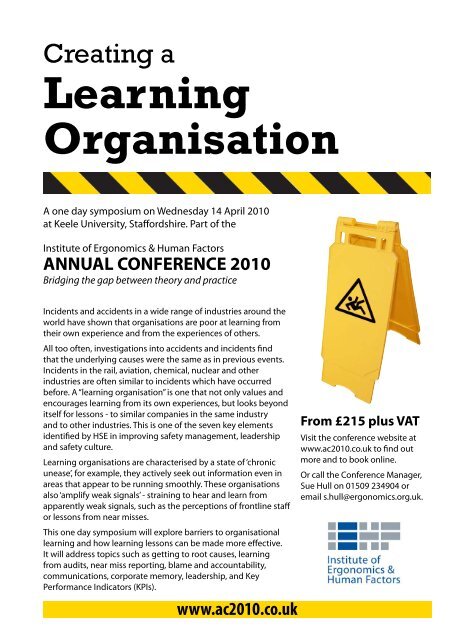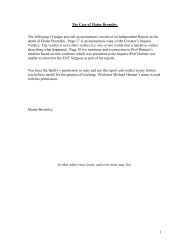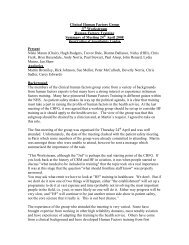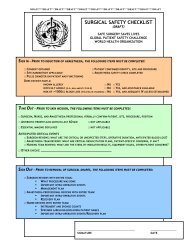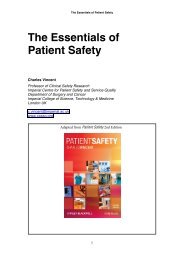Learning Organisation - Clinical Human Factors Group
Learning Organisation - Clinical Human Factors Group
Learning Organisation - Clinical Human Factors Group
You also want an ePaper? Increase the reach of your titles
YUMPU automatically turns print PDFs into web optimized ePapers that Google loves.
Creating a<br />
<strong>Learning</strong><br />
<strong>Organisation</strong><br />
A one day symposium on Wednesday 14 April 2010<br />
at Keele University, Staffordshire. Part of the<br />
Institute of Ergonomics & <strong>Human</strong> <strong>Factors</strong><br />
ANNUAL CONFERENCE 2010<br />
Bridging the gap between theory and practice<br />
Incidents and accidents in a wide range of industries around the<br />
world have shown that organisations are poor at learning from<br />
their own experience and from the experiences of others.<br />
All too often, investigations into accidents and incidents find<br />
that the underlying causes were the same as in previous events.<br />
Incidents in the rail, aviation, chemical, nuclear and other<br />
industries are often similar to incidents which have occurred<br />
before. A “learning organisation” is one that not only values and<br />
encourages learning from its own experiences, but looks beyond<br />
itself for lessons - to similar companies in the same industry<br />
and to other industries. This is one of the seven key elements<br />
identified by HSE in improving safety management, leadership<br />
and safety culture.<br />
<strong>Learning</strong> organisations are characterised by a state of ‘chronic<br />
unease’, for example, they actively seek out information even in<br />
areas that appear to be running smoothly. These organisations<br />
also ‘amplify weak signals’ - straining to hear and learn from<br />
apparently weak signals, such as the perceptions of frontline staff<br />
or lessons from near misses.<br />
This one day symposium will explore barriers to organisational<br />
learning and how learning lessons can be made more effective.<br />
It will address topics such as getting to root causes, learning<br />
from audits, near miss reporting, blame and accountability,<br />
communications, corporate memory, leadership, and Key<br />
Performance Indicators (KPIs).<br />
www.ac2010.co.uk<br />
From £215 plus VAT<br />
Visit the conference website at<br />
www.ac2010.co.uk to find out<br />
more and to book online.<br />
Or call the Conference Manager,<br />
Sue Hull on 01509 234904 or<br />
email s.hull@ergonomics.org.uk.
<strong>Organisation</strong>al integrity: challenging ALARP<br />
W I Hamilton, Technical Director, <strong>Human</strong> Engineering Ltd<br />
The concept of ALARP has served well as a guiding principle<br />
for safety management, but this talk will argue that a focus<br />
on ‘reasonably practicable’ can mean missing the opportunity<br />
to improve safety as a byproduct of enhanced human and<br />
organisational performance.<br />
Ian is a Fellow of the Institute of Ergonomics & <strong>Human</strong> <strong>Factors</strong><br />
and a Chartered Psychologist. Following graduation, Ian worked in the defence sector,<br />
including the Eurofighter cockpit design. He then moved to the CAA, specialising in<br />
Air Traffic Controller workload. As a founding director of <strong>Human</strong> Engineering in 1995,<br />
Ian has led the growth of the professional team, having responsibility for the largest<br />
independent team of qualified human factors consultants in the world.<br />
<strong>Organisation</strong>al learning: who, when and how<br />
Liz Carver, KM Lead, Advanced Technology Centre<br />
“<strong>Learning</strong> from experience” is a well-used phrase and often results<br />
in ‘lessons learned’, which may be stored in a database. But there<br />
are much more important questions to be asked such as: When<br />
should learning happen Who needs to do the learning Can I<br />
learn from my own experience How is the learning going to be<br />
supported The talk will aim to tackle these questions and more<br />
and reference studies to understand how enablers and barriers<br />
have been used to work towards a Seek, Share and Learn culture both to embed safe<br />
and effective practices and to enhance business performance.<br />
Liz is a human factors specialist with over 30 years’ research experience. Recently<br />
she has been concerned with how we build things rather than what. She is working<br />
at a corporate level with BAE Systems’ Engineering and Project Management Global<br />
Councils as well as with individual business units to develop both technological and<br />
behavioural solutions to enable knowledge enabled collaborative working.<br />
Establishing Communities of Practice<br />
Tim Hawley, Associate Director, Arup<br />
Fostering collaboration and knowledge sharing across<br />
organisational silos and informal networks, to learn, solve<br />
problems and improve working practices will be the basis for<br />
this talk. It will cover experience from Arup’s global networks<br />
and the establishment of Communities of Practice within MTR<br />
Corporation’s Project Division in Hong Kong.<br />
Tim is a senior management consultant and project director, focussing on business<br />
performance improvement and change management. He is responsible for<br />
Arup Consulting’s People & <strong>Organisation</strong>al Change team, comprising a group of<br />
organisational psychologists, change experts and human factors consultants.<br />
Tim has extensive experience working with clients in Europe, US, Hong Kong and<br />
China, on business and organisational transformational programmes from strategy<br />
development to implementation.<br />
<strong>Human</strong> factors investigation in the rail industry<br />
Emma Lowe, Senior Ergonomist, Network Rail<br />
In establishing what happened and why, it is important to understand the types of<br />
errors that can occur and the factors that influence people’s behaviour and increase<br />
their potential for errors. Typically investigator training does not cover human factors<br />
issues in sufficient depth to ensure systematic and consistent consideration of factors<br />
contributing to the causes of incidents. Neither does it cover in detail the processes<br />
by which we might elicit such information in an accurate and objective way. In order<br />
to address this gap Network Rail launched an e-learning programme in 2008: Why<br />
People Make Mistakes: Investigating the <strong>Human</strong> <strong>Factors</strong>. This paper will provide a<br />
detailed review of that programme.<br />
Emma joined the rail industry in 1994 and has been involved in safety management,<br />
competence management and culture change. Emma has worked collaboratively to<br />
ensure human factors is integrated into the business and the key risks associated with<br />
human performance. She has been involved in projects to do with workload, human<br />
error, training and competence assessment, shiftwork and stress management.<br />
Developing Safety Performance Indicators for Major<br />
Hazard Industries<br />
Peter Dawson, Principal Specialist Inspector, HSE<br />
A methodology for the development and application of such<br />
indicators was set out in HSG 254, published in 2006. Findings<br />
from worldwide incident investigations continue to demonstrate<br />
the importance of active monitoring of process safety control<br />
and prevention systems to give early warning of their failure<br />
and avoid a catastrophe. The use of such indicators is now seen<br />
as a vital component of successful safety leadership, which both<br />
HSE and industry are actively promoting. The presentation will outline how the HSE<br />
methodology, and also the more recent sector specific and international guidance,<br />
is being applied in the UK and how this can make a significant contribution to the<br />
prevention of major accidents.<br />
Peter has worked as a Safety Specialist Inspector in HSE’s Hazardous Installations<br />
Directorate for the last 12 years, and currently manages a team of Specialists carrying<br />
out technical assessments, inspections and investigations on a range of chemical and<br />
on-shore Major Hazard sites.<br />
Melinda Lyons, NPSA<br />
The NPSA’s National Reporting and <strong>Learning</strong> Service manages<br />
the incident reports received from the NHS. Now maintaining a<br />
database with over 4 million incident reports used to identify risk<br />
and to generate solutions for the third largest workforce in the<br />
world, Melinda will present on the unique challenges that face<br />
the NPSA to improve healthcare processes for patient safety.<br />
Melinda has worked in human factors and safety for over 10 years, specialising in<br />
emergency management and human error prediction in industries including offshore<br />
and air traffic management. For the last five years, she has focussed on applying<br />
human factors in patient safety and is currently the <strong>Human</strong> <strong>Factors</strong> Lead at the<br />
National Patient Safety Agency (NPSA).<br />
Richard Scaife, Director, The Keil Centre<br />
Richard has over 20 years’ experience gained in a wide range of<br />
industries including aviation, defence, nuclear, chemical process,<br />
oil and gas, rail and construction. Richard’s work has focussed<br />
primarily on the application of human factors to improving<br />
safety performance, (including human error, safety culture and<br />
behavioural safety) and the design and evaluation of equipment<br />
to meet user requirements.<br />
Rob Miles, Principal Specialist Inspector, <strong>Human</strong> <strong>Factors</strong>, HSE<br />
Drawing on HSE’s own research along with personal experience<br />
from many inspections of offshore installations and the<br />
organisations that operate them, Rob will endeavour to provide<br />
some answers to questions such as: What do we mean by a<br />
‘learning organisation’ and what processes should we be able to<br />
find in one How do organisations successfully or unsuccessfully<br />
use incidents and near misses and why What should the<br />
effective outcome to an internal incident investigation look like What characterises a<br />
successful change<br />
Rob leads on the topic of <strong>Human</strong> and <strong>Organisation</strong>al <strong>Factors</strong> for the Offshore division<br />
of the HSE. He is ably assisted by a team of Specialist H&OF Inspectors providing<br />
inspection, enforcement and advice to the UK offshore industry on topics from<br />
organisational and behavioural change to user interfaces. His particular interests<br />
include safety management systems, shiftwork, competence, behaviour modification,<br />
and drug abuse in the workplace.<br />
Also presenting will be Mike Williams, University of Exeter on <strong>Learning</strong><br />
about system resilience from a hospital bed crisis.


